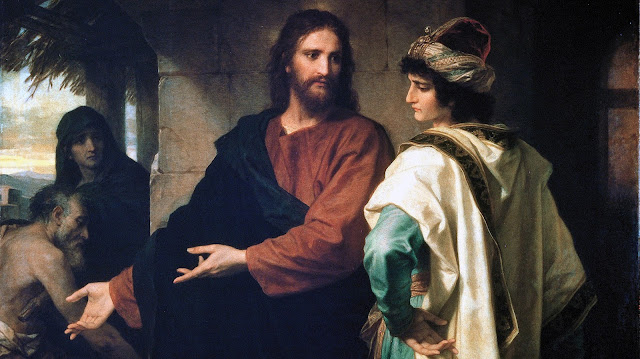“Jesus looked at him and loved him. ‘One thing you lack,’ he said. ‘Go, sell everything you have and give to the poor, and you will have treasure in heaven. Then come, follow me’” (Mark 10:21).
What if we truly loved everyone we meet? How would that change how we interact with people?
Let’s review the story we call “The Rich Young Ruler”. A young man asks Jesus what he must do to inherit eternal life. Jesus reminds of the more man-focused commandments: “You shall not murder, you shall not commit adultery, you shall not steal, you shall not give false testimony, you shall not defraud, honor your father and mother” (Mark 10:19).
He replies, “All these I have kept since I was a boy” (v20).
Mark’s account includes this interesting comment: “Jesus looked at him and loved him” (v21).
So Jesus tells him he needs to sell everything he has and give it away. At this, the man left, proving that he loved his wealth more than God, violating the first commandment. As Jesus taught on another occasion, “You cannot serve God and Mammon” (Matt 6:24).
Jesus looked at him and saw his pride and idolatry. And loved him. That love didn’t make him overlook the man’s sin; love made him address it. So he told him how to get past it and join Jesus. Jesus’ instructions might seem harsh, but he was doing it out of love. He wanted this young man to come to him. But the man needed to face the truth to do it.
What if love was the basis of our every encounter with people? What if we looked at every person we met and intentionally saw a person made in the image of God, a soul for whom Christ died, and a lost sheep the Shepherd greatly desires to find?
Apologists have a reputation, deservedly, of being abrasive and argumentative. What if they went into every exchange looking first and foremost for the way to show love to this person?
Culture warriors have a reputation for becoming angry and forgetting Christlike behavior. What if they went into every conversation seeing the other people involved primarily as someone who needs to see Jesus in them?
Doing this does not mean we don’t acknowledge their sin and their need for Christ. Quite the opposite. In his powerful little book The Grace and Truth Paradox, Randy Alcorn points out that Jesus models a life of grace and truth for us. Both are necessary. Neither will do the job alone.
If we minimize grace, the world sees no hope for salvation. If we minimize truth, the world sees no need for salvation. To show the world Jesus, we must offer unabridged grace and truth, emphasizing both, apologizing for neither. ...
Truth without grace crushes people and ceases to be truth. Grace without truth deceives people and ceases to be grace.
Whether you see yourself as an apologist or an evangelist or simply as a Christ-follower who’s trying to honor Jesus, we can learn to go into every encounter and love the other person. We can love the kid who bags our groceries. We can love the guy who makes our sandwich. We can love the woman at work who talks about us behind our back. We can love the boss who seemingly lives to make our lives difficult.
Easier said than done? Absolutely. Achievable? Yes. It’ll require a new habit of thought and a lot of prayer — prayer at home, at the grocery store, and at work. But this is the life Jesus modeled for us and the life to which he calls us. Let us learn to see people through Jesus' eyes.
Image: Heinrich Hofmann, "Christ and the Rich Young Ruler" 1889

No comments:
Post a Comment